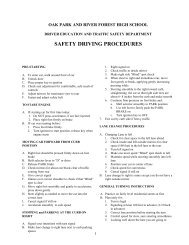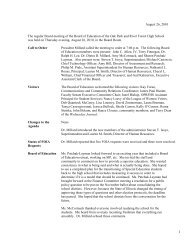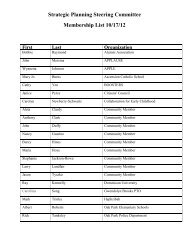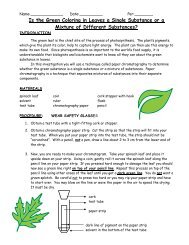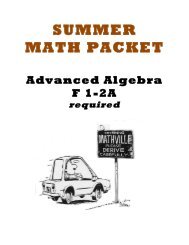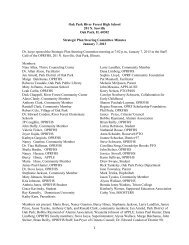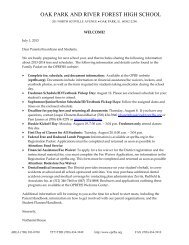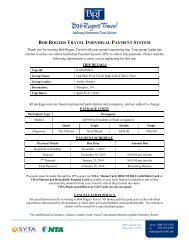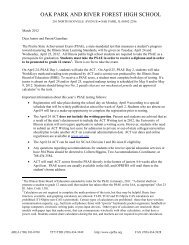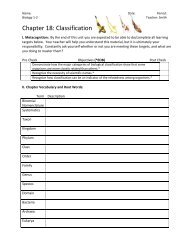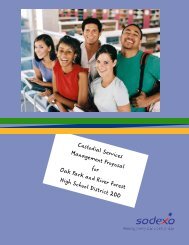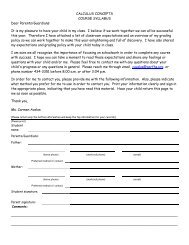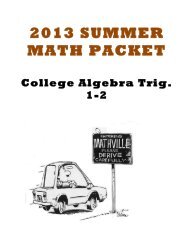College Readiness Benchmarks & The Role of Naviance
College Readiness Benchmarks & The Role of Naviance
College Readiness Benchmarks & The Role of Naviance
- No tags were found...
You also want an ePaper? Increase the reach of your titles
YUMPU automatically turns print PDFs into web optimized ePapers that Google loves.
¡ Freshman Year§ October: Freshman Transition Meetings§ February: Development <strong>of</strong> individual Four-Year Plans and course selection§ April: “Do What You Are” and Introduction to <strong>Naviance</strong>¡ Sophomore Year§ February: Course selection for junior year and continued development <strong>of</strong>Four-Year Plan§ March: <strong>College</strong> <strong>Readiness</strong> <strong>Benchmarks</strong> & <strong>Naviance</strong> Parent Night§ April: Pre-<strong>College</strong> Planning & <strong>Naviance</strong> Group Meetings
¡ <strong>College</strong> readiness is “the level <strong>of</strong> preparation a student needsin order to enroll and succeed—without remediation—in acredit-bearing general education course at a postsecondaryinstitution…”--David Conley, Educational Policy Improvement Center¡ <strong>College</strong> readiness is not just about getting INTO college…it isreally about getting OUT <strong>of</strong> college.
¡ Key Cognitive Strategies¡ Academic Knowledge and Skills¡ Academic Behaviors¡ Contextual Skills and Awareness
¡ Problem-Solving¡ Inquisitiveness¡ Precision / Accuracy¡ Interpretation¡ Reasoning¡ Research¡ Intellectual Openness
¡ We define this as taking the most challenging courses inwhich a student can be successful.§ 4 Years <strong>of</strong> English§ 3-4 Years <strong>of</strong> Math§ 3-4 Years <strong>of</strong> History / Social Sciences§ 3-4 Years <strong>of</strong> Science§ 2-4 Years <strong>of</strong> a World Language
<strong>College</strong>-ready students:§ Display strong writing skills (Expository, descriptive, andpersuasive)§ Develop strong research skills§ Engage their texts critically§ Build vocabulary in order to move towards advanced literacy§ Recommended read: 101 Great Books for <strong>College</strong>-BoundReaders
<strong>College</strong>-ready students:¡ Have a thorough understanding <strong>of</strong> concepts, principles, andtechniques <strong>of</strong> Algebra¡ Are able to apply conceptual understanding <strong>of</strong> mathematicsin order to solve problems¡ Understand and use estimation¡ Use a calculator as a tool rather than a crutch
<strong>College</strong>-ready students:¡ Can interpret their sources¡ Evaluate evidence and competing claims¡ Understand themes and the flow <strong>of</strong> events within a largerframework¡ Understand “Big Ideas” that are used to order and structuredetail¡ Possess strong writing and reading skills
<strong>College</strong>-ready students:¡ Understand and utilize the scientific method¡ Use empirical evidence to draw conclusions¡ Have a mastery <strong>of</strong> core concepts, principles, laws, andvocabulary¡ Use models and systems as ways to organize and comprehendcomplex phenomena¡ Engage in detailed lab experiments and write-ups
<strong>College</strong>-ready students:¡ Communicate effectively with speakers <strong>of</strong> another language¡ Possess strong listening, speaking, reading, writing skills¡ Understand and appreciate culture as context for language
<strong>College</strong>-ready students:¡ Have an appreciation <strong>of</strong> dance, theater, music, and thevisual arts¡ Have developed a mastery <strong>of</strong> technique in their area¡ Have developed a personal style and understand themselves asinstruments <strong>of</strong> communication and expression¡ Understand and appreciate the innovative contributors to thefield¡ Have developed a formulation and presentation <strong>of</strong> difficultquestions
<strong>College</strong>-ready students:¡ Have self-awareness, develop self-monitoring, and engage inself- control¡ Employ effective study skills¡ Master the art <strong>of</strong> time management¡ Develop strong communication skills (both oral and written)¡ Learn to work effectively with others
CONTEXTUAL SKILLS AND AWARENESS<strong>College</strong>-ready students:¡ Understand how colleges work as a culture and a system¡ Possess strong college knowledge¡ Employ interpersonal and social skills with a cross section <strong>of</strong>both academicians and peers
PRE-COLLEGE PLANNINGWhat your sophomore can do right now:¡ Conduct a self-assessment to develop idea <strong>of</strong> what they wantand need in a college¡ Understand what colleges look for in prospective students¡ Research which colleges match your personal goals¡ Visit college campuses¡ Evaluate your college choices: Do your colleges meet yourcriteria?¡ Investigate financial assistance
§ Where does your student stand?§ What are his/her plans and goals for after high school?§ Is your student on track for post-secondary readiness?§ How can your student improve his/her academic skills?
PLAN is like a “snapshot” <strong>of</strong> current academic strengths andweaknesses in English, mathematics, reading, and science.Scale scores range from 1-32.
PLAN is not an intelligence test. Students can improvetheir test performance by working hard in classes thatchallenge them.
¡ Four-year college¡ Community college¡ Entry-level workforce¡ Gap yearA number <strong>of</strong> studies show that readiness for college andreadiness for work require similar levels <strong>of</strong> knowledge andskill, especially in reading and math.
Students who score at or above a <strong>College</strong> <strong>Readiness</strong> Benchmark on the ACThave a 50% chance <strong>of</strong> earning a B or better and a 75% chance <strong>of</strong> earning aC or better in the corresponding entry-level college course.
¡ Typical growth is 2-3 points per academic year¡ PLAN composite <strong>of</strong> 19 in freshman year¡ ACT composite <strong>of</strong> 23-25 in junior year
§ This range is an estimate, not a guarantee.§ Some students who improve their academic performance byworking hard in challenging classes may earn ACT compositescores higher than their estimated score range.§ Students who do not maintain good academic work in schoolmay earn ACT composite scores below their estimated scoringrange.
ACT’S IDEAS FOR PROGRESS
IDEAS FOR PROGRESS: MATH
¡ Take challenging courses in high school.¡ Explore the many career options available and think abouthow career choices will affect your student’s future.¡ Set career goals and develop an educational plan to achievethem.
<strong>Naviance</strong> in a nutshell:<strong>Naviance</strong> links counselors and schoolswith students and parentsto improve college and career planning.
ACCESSING NAVIANCEFAMILY CONNECTION¡ To visit <strong>Naviance</strong>, start at the OPRF home page:www.oprfhs.org¡ Click on the following links:§ Parents/Guardians§ <strong>College</strong> Planning—<strong>Naviance</strong>§ I need to register§ Enter password for parent access:Guardian 1=“A” plus student ID#Guardian 2=“B” plus student ID #§ Follow prompts as directed
¡ Approximately 58 percent <strong>of</strong> first-time, full-time bachelor’s orequivalent degree-seekers attending 4-year institutionscompleted a bachelor or equivalent degree within 6 years.¡ <strong>The</strong> 4-year graduation rate <strong>of</strong> all bachelor’s-seeking studentswas 50 percent at private, not-for-pr<strong>of</strong>it institutions, 29percent at public institutions, and 26 percent at private, forpr<strong>of</strong>itinstitutions.
¡ Fewer than half <strong>of</strong> U.S. workers are satisfied with their jobs,the lowest level since record-keeping began 22 years ago.
¡ <strong>Naviance</strong> provides tools for students to explore who they are,discover strengths and weaknesses, and determine whatcareer and college environment may be right for them.¡ Taking time to explore now can alleviate stress for studentsand parents later.
NAVIANCE: GETTING STARTED
MORE INFORMATION…¡ For more information on your student’s personality type:http://www.personalitypage.com/high-level.html¡ For more information on career clusters: http://www.careerclusters.org/16clusters.cfm¡ For more information on your student’s interest inventoryresults: http://www.personalitydesk.com/story/understanding-your-results-strong-interest-inventory
GROUP MEETINGS FOR SOPHOMORESDuring the week <strong>of</strong> April 11 th through April 15 th ,Counselors will be meeting in small groups withall <strong>of</strong> their sophomores to share informationregarding college readiness and how to utilize<strong>Naviance</strong>.
THANK YOU FORCOMING OUT TONIGHT!FEEL FREE TO CONTACT YOUR CHILD’SCOUNSELOR FOR ADDITIONALQUESTIONS.<strong>The</strong>CounselingDivision <strong>of</strong>OPRF



